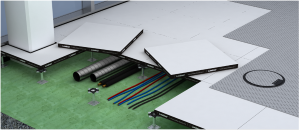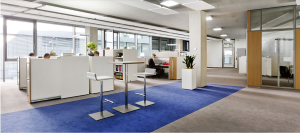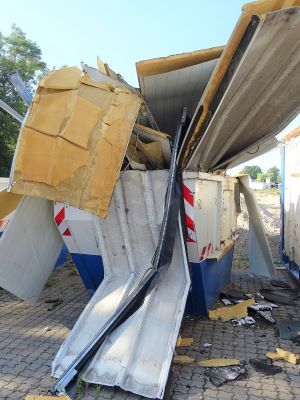Commercial premises are converted at relatively short intervals because they are subject to frequent changes of use or changing needs of the tenants. The aim of the RessProKA project is to develop technical and financial solutions to keep the building products used for commercial premises in circulation for as long as possible.

Resource-relevant finishing trade
The finishing trade is the most important sector in the construction industry in Germany with a transaction volume of around 136 billion euros and around 1.2 million employees in 252,000 companies. The building products used in this sector have significantly shorter turnaround times compared to carcass construction, usually less than ten years.
RessProKA focuses on the optimisation of the technical cycle and the development and implementation of commercial and legal elements in business models for products which may remain the property of the manufacturers throughout their entire service life. After use, the manufacturers are also responsible for recycling and remanufacturing. RessProKA pursues a systemic approach, which is intended to enable the transfer of the developed models to other construction products in terms of concept and instruments.

Interior as an examination unit
For this purpose, in contrast to previous approaches with individual solutions, the interior is considered as a unit and all elements contained therein such as doors, floors, etc. are included in the investigations. As a result, a large number of different material flows and materials are taken into account. The focus here is on commercial and public building construction. In this area, more standardised construction methods are used, the replacement cycles are significantly shorter and the degree of individualisation is much lower than, for example, in private residential construction. The possibilities offered by digitization - for example, by means of Building Information Modeling (BIM) - for data documentation and for marking for location and tracking are also to be investigated and evaluated. These evaluations will also feed into the development of new approaches.
In addition to a further optimisation of the preliminary work already carried out at the project partner Lindner Group KG with regard to technical aspects such as construction, maintenance, deconstruction and recycling, processing and possible applications of secondary raw materials, the questions of concrete implementation in a business model are the focus of the considerations. Only if the corresponding approaches offer incentives for both, producers and customers, the comprehensive realization of closed circle for these products can be expected.

Results (Status June 2022)
Starting with a pilot product from the flooring sector, a canvas analysis was first carried out, resulting in the definition of the material and formal goals on the one hand and the cost structure of the further economic consideration on the other. The subsequent GAP analysis leads to the following "Circular Economy building blocks" such as the offer of a return obligation, a return right, 2nd use products, services within the contract period and the selection of financing models. In addition to the economic prerequisites, the project team is particularly looking at the ecological impacts of the new business model variants.
Potential for application
The Lindner Group, Europe's largest manufacturer of interior finishing systems for the main areas of ceilings, floors and walls, as well as a complete service provider in the field of drywall construction, will, together with its research partner IWARU from Münster University of Applied Sciences, develop the technical solution approaches which enable the recycling-compatible deconstruction and reuse of interior design elements. BIFAS, an independent research and consulting institute, is responsible, among other things, for developing models that create commercial and legal incentives to maintain the technical and material possibilities of modular building products over several life cycles.
If possible, these business models are to be generalised to such an extent that transferability to other construction products and other construction sectors is possible. Important support in this respect is also provided by the associated partners involved in the project, such as Schüco, e.g. for the window, external doors or veneer segments, and the Re!source Stiftung e.V., as an independent initiative from business, society, science and politics. The integration into the certification system of the Deutsche Gesellschaft für Nachhaltiges Bauen e. V. is being prepared.
News
In the 22nd episode of the DGAW podcast, the RessProKA research project answers the question of whether commercial premises can be recyclable with Prof. Dr Sabine Flamme, Mr Marcel Gröpler and Dr Gernot Pehnelt.
The RessProKa project was selected for the "BDAcall - Business Ideas for Post-Growth Construction", which sought ecological business ideas that make a significant contribution to climate-friendly and resource-saving architecture. A total of eleven projects were identified that contribute to the implementation of the postulates from the BDA position paper "The House of the Earth. (10/28/2022)
Publications
Final Report (short,German, 2023)
Project flyer of the funding measure (German / English) (March 2021)
The project flyers offer an insight into the contents and goals of the ReziProK projects and present first results in each case.
Project sheets of the funding measure (German) (August 2019)
The project sheets provide a brief overview of the individual projects and their goals.
Klöpper D., Flamme S. und Pehnelt G. 2023: Kreislaufwirtschaft im Bauwesen (muellundabfall.de)
"Transformation from a linear to a circular business model". (21.07.2023)
Link to article (© Müll und Abfall); ISBN: 978-3-944310-69-5
Research project develops sustainable business model for interior construction - in German (28.10.2022)
Link to article (© Dt. Ingenieurblatt)
Keeping building products in circulation - in German (11.05.2020)
Contributions to the ReziProK Transfer Conference in June 2022
Poster (German) (June 2022)
Presentation (German) (June 2022)
Picture credits: Lindner Group, Arnstorf; IWARU, Münster
